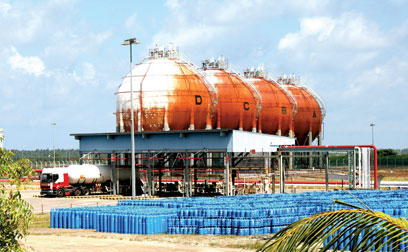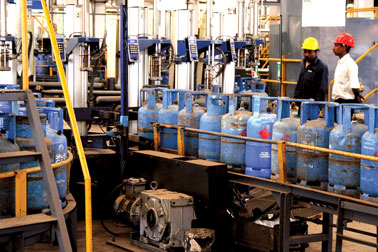Shell buy back not a nationalisation
With the purchase of 51% of Shell Gas Lanka shares and 100% of Shell
Terminal Lanka shares by the government at US$ 63 million the largest
gas supplier of the country became a state institution again. Litro the
new state company will remain as the leader in the duopoly gas market.
The view of the public, business community and intellectuals differ
on the future of the gas market.
 Deputy minister of Economic Development Ranjith Siyambalapitiys said
that this deal does not indicate a reverse of government policies. Deputy minister of Economic Development Ranjith Siyambalapitiys said
that this deal does not indicate a reverse of government policies.
Private sector and foreign investors need not worry. The government
trusts the private sector as the engine of growth.
Our support to the private sector reflects in our tax policies.
This decision was taken considering consumer interest, he said.
He said that this deal was totally different from the nationalisation
begun in the 1950s as the government has paid the total value of the
business.
This government trusts the state sector as well and we think the
government too can do business.
This deal, the whole US$68 million was paid by Sri Lanka Insurance,
another government institution, he said.
What ever the long-term economic implications, the majority of the
people who voted for the economic policies of this government will be
happy with this re-nationalisation process.
The Mahinda Chintana policies as well as the previous Rata Perata
policies of the UPFA government clearly said that the government would
stop privatisation of state institutions.
From 2004, privatisation has been stopped and some critiques argue
that there is a new nationalisation drive in the country.
After the Supreme Court (SC) decision in 2008, Sri Lankan Insurance
Company and its subsidiary Lanka Hospitals became state institutions.
In 2008, based on another SC decision Lanka Marine Service Limited
became a state institution. In July this year SriLankan Airlines' shares
were repurchased by the government from Emirates and again the national
carrier became a totally state-owned institution. Shell Gas is the
latest, they said.
Nationalisation of private companies in Sri Lanka was started in 1956
by the SLFP government and it is one of the radical policy changes in
Sri Lanka.
This move was also led by nationalist sentiment. After independence
in 1948, most of the strategically important key businesses were in
private hands, local or foreign British companies.
World politics was polarised and governments that followed the
policies of the socialist block trusted the state sector. Bus
transportation and ports were nationalised in 1958 and the process
continued with nationalisation of local subsidiaries of foreign owned
petroleum companies in 1961, graphite mines in 1971, locally owned tea
and rubber plantations in 1972 and Sterling plantations or foreign owned
companies in 1975. Thereafter, these key businesses were run by the
state and growth of these businesses were stagnant. By 1976 most of them
were running at a loss and had become a burden on the people.
Bureaucracy, political interference, lack of professionalism and
managerial expertise, capital and technology all led to this situation.
After 1977, policies were reversed and gradually turned from open
economic policies to extreme neo-liberal policies under the UNP regime.
Privatisation was one of the key components in economic policies
during the 17 years and two years thereafter from 2001-2004 under UNP
governments.
Almost all state owned institutions, industries, plantations,
petroleum and utility services were privatised and other key
institutions such as CEB, Water Supply, ports were on the verge of
privatisation.
The efforts failed due to protest from trade unions and the public.
Consumers expect relief after the nationalisation of Shell. They said
that the price of gas is extremely high. Most of the people we
interviewed on the buy back of the gas business from Shell, said that
they expect a price reduction.
They said that the multinational exploited them and the government
will reduce the price.
However, some economists say that this policy is wrong and it will
not deliver benefits to the consumers. We need more and more new players
into gas and petroleum business to increase the competition in the
market.
A Monopoly or cartel of a few companies will not deliver benefits to
the consumers.
The Sri Lankan economy is in transition. We need multinational
companies such as Shell as only they can bring large investments.
When we consider the gas and petroleum sector, we can learn a lesson
from Singapore. The country that does not produce a drop of crude oil is
a major oil exporter because they refine and export oil.
Using its strategic location Sri Lanka can also create a gas and oil
hub in the region, but for that, we need multinational companies, they
said.
 Dr.Ranjith Bandara of the Department of Economics, University of
Colombo and economic advisor to the government said that this decision
was taken considering the political and economic situation in the
country. Dr.Ranjith Bandara of the Department of Economics, University of
Colombo and economic advisor to the government said that this decision
was taken considering the political and economic situation in the
country.
The Government wants to set up a mechanism to control the prices of
essential commodities that have a strong impact on the cost of living.
Setting up of Lak Sathosa, Markfed, modernisation of the co-operative
system, re-establishment of the Paddy Marketing Board were made under
this program.
The buy back of Shell is the latest. We have observed that price
cannot be controlled through the market mechanism only, he said.
The government will broad base the ownership of Litro by selling 49%
of Litro shares in the Colombo Stock Exchange.
This will also positively impact the CSE, Dr.Bandara said.
GW
|

